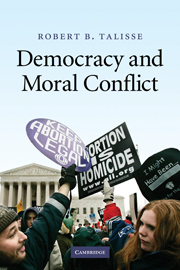2 - Against the politics of omission
Published online by Cambridge University Press: 03 December 2009
Summary
In Chapter 1, I presented the problem of deep politics. To repeat, the problem emerges out of the fact that citizens of contemporary democracies increasingly turn to their respective moral commitments – religious and secular – for guidance in political action. Yet citizens are deeply divided at the level of these commitments. Accordingly, contemporary democratic citizens do not regard themselves as engaged in a process by which their individual preferences are aggregated to make public policy that is fair and hence justifiable to all; instead, citizens increasingly see themselves as embroiled in a zero-sum contest among conflicting and incompatible religious and moral visions: a civil war by other means. As these visions represent deep commitments about fundamental matters of the good, it is difficult to see how democratic processes can be justified to those whose values lose out. Those who lose have a strong incentive to exercise what Albert Hirschman (1970) fittingly characterized as “exit.” But since many citizens take the project of instantiating their deepest value commitments in the political order to be morally imperative, and perhaps overriding, their “exit” is not likely to take the form of a total (and peaceful) withdrawal from politics; rather, it is likely to manifest in a rejection of the idea that their political ends should be pursued by democratic means. That is, they will exit from democratic politics, not politics as such.
- Type
- Chapter
- Information
- Democracy and Moral Conflict , pp. 42 - 78Publisher: Cambridge University PressPrint publication year: 2009



